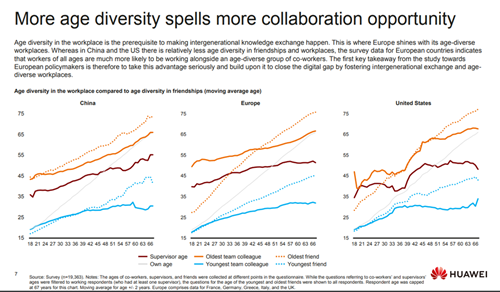The effects of digitalization on the impact of demographic shifts
/huaweiSurvey.PNG)
Demographic shifts pose significant challenges for developed economies, but digitalization can help mitigate some negative effects through automation and productivity gains. Huawei's survey in 2022 of over 21,000 participants across seven countries highlights the need for upskilling to fully benefit from digitalization.
The survey found that the U.S. workforce outperforms Europe and China in digital skills, particularly among early-career workers. However, all regions face a digital skills gap between young and older workers. Intergenerational collaboration, especially in Europe's age-diverse workplaces, could be key to addressing this gap and boosting knowledge exchange.
Intergenerational collaboration is seen as a promising approach, with 29% of Europeans aged 55 and older already learning digital skills from colleagues at least ten years their junior. Europe's age-diverse workplaces, more so than in China and the U.S., are well-positioned to foster such knowledge exchange, and digitalization can further enhance this dynamic. In highly digitalised firms, knowledge sharing increases by approximately 20% compared to less digitalized ones.The survey also underscores that advanced, touch-centric, and virtual interfaces, such as voice and gesture inputs, are effective across all age groups. As these technologies become more widespread, we need to rethink how digital skills are conceptualized and assessed.
Finally, as Europe seeks to boost automation and productivity, it must consider the varying attitudes toward advanced technologies like robots across age groups and regions. China demonstrates a notably positive outlook on robots, while attitudes in Europe and the U.S. are less favorable. Understanding these differences is crucial to maximizing the benefits of digitalization, particularly in terms of productivity and workforce upskilling. For more insights from the survey see here.
See here for a focus on urban digitalisation and the example of the Futian District in Shenzhen, China.
---
Huawei is #IASPnairobi Platinum sponsor
/)


/canvascolor(0xffffffff)/2022_06_14_Portugal_UPTEC.png)
/canvascolor(0xffffffff)/2017_11_17_UK_Surrey_Research_Park.png)
/canvascolor(0xffffffff)/2017_11_21_UK_Univ_of_Warwick_SP.jpg)
/canvascolor(0xffffffff)/PCT-GUAM_-LOGO-NORMAL_1.png)
/canvascolor(0xffffffff)/buildings2.png)
/canvascolor(0xffffffff)/2022_01_26_Spain_PCT_Tenerife.jpg)
/canvascolor(0xffffffff)/MemberLogo-55206-93101.png)
/canvascolor(0xffffffff)/2023_10_26_Canada_Innovation_Saskatchewan.png)
/canvascolor(0xffffffff)/ppnt_logo_EN.png)
/canvascolor(0xffffffff)/2024_09_26_Thailand_Northeastern_2.jpg)
/canvascolor(0xffffffff)/MemberLogo-54503-6263.jpg)
/canvascolor(0xffffffff)/PSP_Logo-mit-Schriftzug_1.jpg)
/canvascolor(0xffffffff)/logo-oscuro-parque-cientifico-ua.png.png)
/canvascolor(0xffffffff)/MemberLogo-5779-6245.jpg)
/canvascolor(0xffffffff)/La_Salle_Barcelon_logo.png)
/canvascolor(0xffffffff)/MemberLogo-19705-6247.png)
/canvascolor(0xffffffff)/2019_06_12_Taiwan_Hsinchu_SP.JPG)
/canvascolor(0xffffffff)/HIPB_Logo_2.jpg)
/canvascolor(0xffffffff)/MemberLogo-59301-6100.jpg)
/canvascolor(0xffffffff)/MemberLogo-43501-149701.jpg)
/canvascolor(0xffffffff)/Logo_Bioindustry_nuovo_1.jpg)
/canvascolor(0xffffffff)/GPNT_logo_RGB_EN_1.png)
/canvascolor(0xffffffff)/2017_10_31_Spain_Fundacion_Comunitat_Valencian.jpg)
/canvascolor(0xffffffff)/MemberLogo-5751-6208.jpg)
/canvascolor(0xffffffff)/MemberLogo-5650-6079.jpg)
